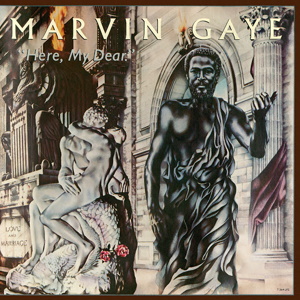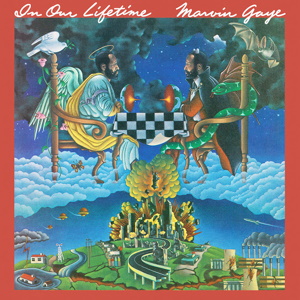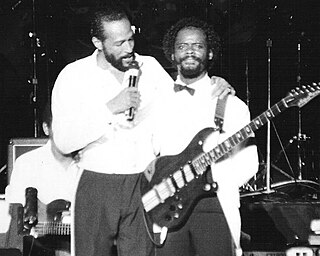
Marvin Pentz Gaye Jr. was an American soul and R&B singer, songwriter, and musician. He helped shape the sound of Motown in the 1960s, first as an in-house session player and later as a solo artist with a string of successes, which earned him the nicknames "Prince of Motown" and "Prince of Soul".

What's Going On is the eleventh studio album by American soul singer Marvin Gaye. It was released on May 21, 1971, by the Motown Records subsidiary label Tamla. Recorded between 1970 and 1971 in sessions at Hitsville U.S.A., Golden World, United Sound Studios in Detroit, and at The Sound Factory in West Hollywood, California, it was Gaye's first album to credit him as producer and to credit Motown's in-house session musicians, known as the Funk Brothers.

Here, My Dear is the fifteenth studio album by American singer and songwriter Marvin Gaye, released as a double album on December 15, 1978, on Motown-subsidiary label Tamla Records. Recording sessions for the album took place between 1977 and 1978 at Gaye's personal studios, Marvin Gaye Studios, in Los Angeles, California. The album was notable for its subject matter focusing largely on Gaye's acrimonious divorce from his first wife, Anna Gordy Gaye.

"Got to Give It Up" is a song by American music artist Marvin Gaye. Written by the singer and produced by Art Stewart as a response to a request from Gaye's record label that he perform disco music, it was released in March 1977.

"Distant Lover" is the sixth song issued on singer Marvin Gaye's 1973 album, Let's Get It On and the B-side of the second single from that album, "Come Get to This". A live recording was issued as a single in 1974. The live version of the song was Gaye's most successful single during the three-year gap between Let's Get It On and his following 1976 album, I Want You.
"Stubborn Kind of Fellow" is a 1962 song recorded by Marvin Gaye for the Tamla label. Co-written by Gaye and produced by William "Mickey" Stevenson, "Stubborn Kind of Fellow" became Gaye's first hit single, reaching the top 10 of the R&B chart and the top 50 of the Billboard Hot 100 in late 1962.

In Our Lifetime? is the sixteenth studio album by soul musician Marvin Gaye, released January 15, 1981, on Motown label Tamla Records. Recording sessions for the album took place at Marvin's Room in Los Angeles, California, Seawest Recording Studio in Honolulu, Hawaii, and at Odyssey Studios in London, England, throughout 1979 and 1980. The album cover was designed by Neil Breeden. Gaye's final album for Motown before leaving for Columbia Records, the album was the follow-up to the commercial failure of Here, My Dear, a double album which chronicled the singer's divorce from Anna Gordy. Entirely written, produced, arranged, and mixed by Gaye, In Our Lifetime? was a departure for Gaye from the disco stylings of his previous two studio efforts and was seen as one of the best albums of the singer's late-Motown period.

Diana & Marvin is a duets album by American soul musicians Diana Ross and Marvin Gaye, released October 26, 1973 on Motown. Recording sessions for the album took place between 1971 and 1973 at Motown Recording Studios in Hollywood, California. Gaye and Ross were widely recognized at the time as two of the top pop music performers.

Live at the London Palladium is a live double album by soul musician Marvin Gaye, released March 15, 1977, on Tamla Records. Recording sessions took place live at several concerts at the London Palladium in London, England, in October 1976, with the exception of the hit single "Got to Give It Up", which was recorded at Gaye's Los Angeles studio Marvin's Room on January 31, 1977. Live at the London Palladium features intimate performances by Gaye of many of his career highlights, including early hits for Motown and recent material from his previous three studio albums. As with his previous live album, Marvin Gaye Live!, production of the record was handled entirely by Gaye, except for the studio portion, "Got to Give It Up", which was managed by Art Stewart.

Twilight as Played by The Twilight Singers is the first album by The Twilight Singers, released by Columbia Records in 2000.
"Anna's Song" is a song recorded by singer Marvin Gaye as part of his 1978 album, Here, My Dear. Recorded during the midst of Marvin and estranged wife Anna going through an acrimonious divorce, the song autobiographically depicted several parts of Marvin and Anna's past including one lyric that hints at his first hit single, "Stubborn Kind of Fellow" where Gaye says "What's it, husband, makes you so stubborn?". A memorable part of the song for Marvin's fans includes a verse where Marvin's vocals rise when singing Anna's name. Unlike most of the songs on the album with the exception of "Sparrow", this song was recorded in a jazzy atmosphere.
"When Did You Stop Loving Me, When Did I Stop Loving You" is a 1978 song recorded by singer Marvin Gaye. Taken from his Here, My Dear album, it was written following his 1976 divorce when he was ordered to give half the takings of his next album to ex-wife Anna Gaye. In the album, he "poured his emotions into songs agonisingly documenting their relationship's rise and fall."
"Here, My Dear" is a song written, composed and produced by American soul singer Marvin Gaye, issued on the album of the same name in 1978. The song was a sort of introduction to the deeply confessional and post-divorce concept that gave a chronological look back at the tempestuous marriage between Marvin and first wife Anna. The lyric, You don't have the right to use a son of mine to keep me in line, became a memorable lyric for fans of Gaye and very much was a lyric attacking Anna for demanding alimony and child support payments to support then-twelve-year-old Marvin, III. Marvin then sarcastically told his wife that he dedicated the album to her but warned that she might "not be happy" and telling Anna "this is what you wanted" making a reference to the judge in their divorce case to give up royalties from this album to Anna. The song's musical background would be used for the song "Everybody Needs Love" from this album.
"Everybody Needs Love" is a 1977 song recorded by American soul singer Marvin Gaye, co-composed with "Let's Get It On" co-writer Ed Townsend. The song was issued on the singer's confessional 1978 album, Here, My Dear. Though most of the songs on the album were based on a mostly antagonistic view of Gaye's first wife, Anna Gaye, a few songs like this stood out which discussed how everybody needed love.
"Time to Get It Together" is a 1978 song recorded by Marvin Gaye and issued on Marvin's 1978 album, Here, My Dear. Much like "Everybody Needs Love", "Anger" and "A Funky Space Reincarnation", among others, this song doesn't discuss the demise of Marvin's marriage to Anna Gordy Gaye. Instead the song is a biographical account of the singer's own personal demons as he battled drug abuse, paranoia and depression.
"Falling in Love Again" is a 1977 song recorded by singer Marvin Gaye and issued on his 1978 album, Here, My Dear album. The song was another track on the personal album that did not discuss the demise of his first marriage. Instead of Anna Gaye, the song talked of the other woman in Marvin's life. Described in "You Can Leave, but It's Going to Cost You" as "that young girl", she was Janis Hunter, whom Gaye had married. In a solemn but still certain tone, he wanted to be sure that this time his love for Janis will be what he had always wanted. But as irony would have it, by the time of the album's release, Marvin and Janis' relationship was failing. By the end of the album's promotion, Janis had split from the singer after nearly two years as a married couple. They eventually divorced in February 1981. This song was the last song on Here, My Dear with a reprise from the album's "theme song", "When Did You Stop Loving Me, When Did I Stop Loving You", playing soon afterwards putting the album to a close for good.

Gordon Banks was an American guitarist, producer, writer and musical director. He was voted one of the top 100 guitarists in America by Rolling Stone magazine in 1985.

Divided Soul: The Life of Marvin Gaye is a 1985 biography of American soul singer Marvin Gaye. The biography was written by music reviewer David Ritz including conversations he had with the singer, who put the biography together shortly after Gaye's death at the hands of his father Marvin Gay Sr. in 1984.
"Just Like" is a song recorded by Marvin Gaye in 1978 but not released until after the release of Gaye's posthumous 1985 album Romantically Yours.










